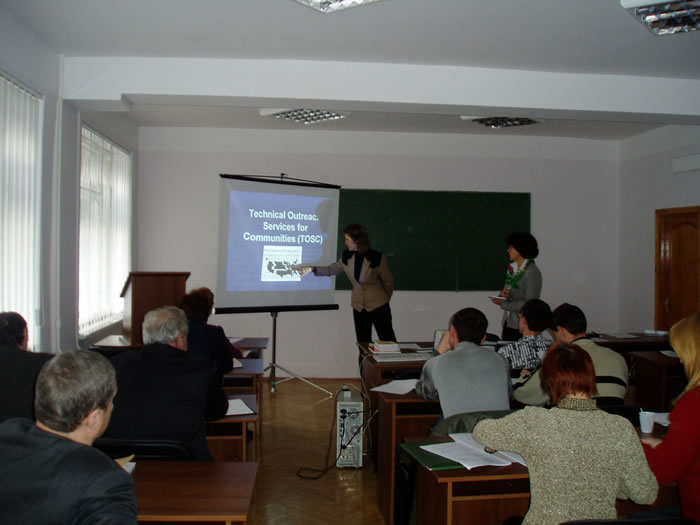Contact CHSR
The Center for Hazardous Substance Research
2010 Durland Hall
Kansas State University
Manhattan, KS 66506
Phone: 785-532-6519
chsr@k-state.edu
News & Upcoming Events
* * * * *
CHSR has been announced as the winner of a $23 million grant from the EPA to expand its Technical Assistance to Brownfields program.
* * * * *
See all upcoming *FREE* TAB Brownfields workshops and webinars
Articles
Growing Climate Solutions Act (link is external)
Partnerships help improve water quality in Kansas (link is external)
Videos
- 2015 International Year of Soils - Watch the video (link is external)
- The Ogallala Road by Julene Blair - Watch the video (link is external)
- The Waters of Kansas - Watch the video (link is external)
Do you have an upcoming sustainability-related conference or workshop you think should be here? Tell us!

Kyiv, Ukraine
The Dnepr River in Kyiv, Ukraine
Project Description
We presently live in a global age in which it is important to work cooperatively with all citizens of the world to develop effective environmental management systems and sustainable communities and societies. There is great citizen interest in environmental health and safety and it is widely seen as an important part of responsible governance. Kansas State University and the Sustainable Development and Ecological Education Center in Ukraine are working cooperatively to develop and implement educational tools and resources that can be used to enhance environmental management in the two countries and elsewhere. There are two important aspects to the effort: The first is to empower citizens to participate in democratic efforts to improve the environment. The second is to provide the environmental education and information that is needed to allow for effective participation.
Collaborative Activities
Representatives from each side of the partnership have traveled to the U.S. and Ukraine to develop relationships and opportunities for collaborative projects. Information has been exchanged on the environmental issues facing both Ukraine and the U.S. and on methods for involving the public in solving these important problems.

KSU shares technical outreach information with
Ukrainian extension specialists
Chernobyl Comemorative Roundtable
Living with radioactive contamination:
A discussion between generations
May 17-19, 2006
Kyiv, Ukraine
In April 2006, the 20th anniversary of the Chernobyl catastrophe was commemorated by a number of international events. Most significantly, in Kyiv on April 24-26, 2006, an International Forum “Twenty years after Chernobyl: Look to the future,” was organized by Ukrainian, Russian and Byelorussian governments. This forum posed questions about the state of the Chernobyl station and shelter, technical aspects of radiation, proper management of nuclear wastes, and the human health impacts of the catastrophe.
We organized a roundtable, “Living with radioactive contamination: A discussion between generations,” as a registered side-event of the International Forum. This roundtable was organized jointly by the Sustainable Development and Ecological Education Center (SDEEC, Ukraine) in cooperation with faculty from several American universities (Applied Indigenous Studies, Northern Arizona University; American Indian Education Program, University of New Mexico; Center for Hazardous Substance Research , Kansas State University; Center for Indigenous Nations Studies, University of Kansas; and the Haskell Indian Nations University Ecology Club). The goal of the roundtable was to create an international dialog between generations to promote an understanding of the impact of multigenerational trauma on societies caused by catastrophes, particularly those involving radioactive contamination in Ukraine and on American Indian lands.
NAU participants gave a presentation at the roundtable
The tragedy of the Chernobyl catastrophe continues to impact the health and wellbeing of Ukrainians twenty years after the nuclear reactor exploded and spewed poisonous gasses over huge regions of Europe and the Former Soviet Union. Native American faculty and students from KU, Haskell and NAU, as well as staff from the Center for Hazardous Substance Research Center at K-State, traveled to Kyiv to speak with college students who have grown up in the aftermath of the catastrophe and exchange stories and insights about coping with nuclear tragedy. Two NAU Applied Indigenous Studies faculty, Drs. Octaviana Trujillo and Lomayumtewa Ishii led a group of four NAU students, Nasbah Ben, Temashio Anderson, Christy Nations, and Valencia Herder. The group also included participants from Haskell Indian Nations University (Becky Begay, Abigail Estes, and Tiffany Tsosie), a graduate student from the Indigenous Nations Studies Program at the University of Kansas, Heidi Mehl.
Haskell students preparing to present during the roundtable.
The importance of access to information about the environment and human health was discussed with an emphasis on the role of the UN Convention “About Access to information, public participation in decision-making and access to justice in environmental matters.” Discussions also centered on decolonization, nation-building, and the challenges to further development of democracy in Ukraine.
The U.S. delegation to the roundtable was representative of several Indigenous nations.
For more information about this event, please see the links below.
- Roundtable agenda (PDF)
- Roundtable minutes (PDF, 100 KB)
Publications and Media
- Coal Mining and the Navajo Nation (PDF, 1645 KB)
- The Cherokee Nation and Tar Creek (PDF, 3314 KB)
- Video comments from Representative Dennis Moore (D-KS) (WMV, 3.41 MB)
Roundtable Sponsors
Ukraine
- Sustainable Development and Ecological Education Center
- National Agricultural University
- Commitee on Environmental Policy and Elimination of the Consequences of the Chernobyl Catastrophe, Ukrainian Parliament
- Alumni Resource Center, Urkaine Fulbright Office
U.S.
- Haskell Indian Nations University Ecology Club
- Kansas State University
- National Science Foundation (Project number DEB 02-03404)
- Northern Arizona University
- University of Kansas
- University of New Mexico
- Public Affairs Section, U.S. Embassy in Ukraine
Contact
For more information about CHSR activities in Ukraine, please contact:
Wendy Griswold
Telephone: (785) 532-6519
Fax: (785) 532-5985
Email: griswold@k-state.edu